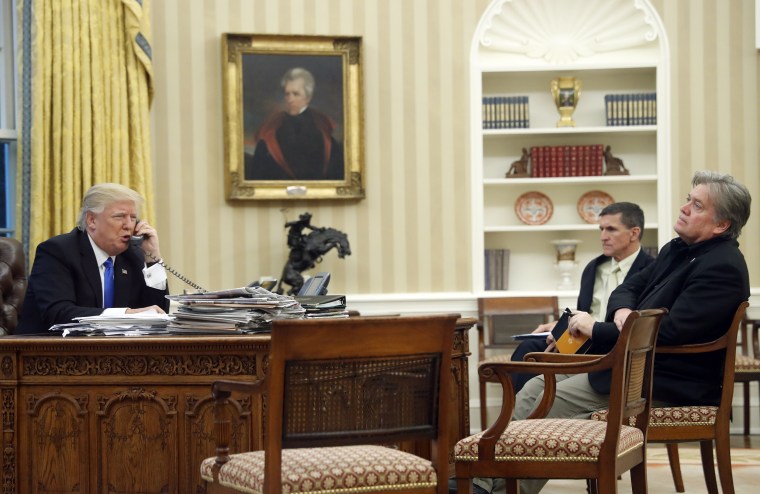Washington is a sports obsessed town — and that’s not a reference to the Redskins or the Nationals. Its sport is politics. And most people, whether journalists or politicians, are focused on who is winning, who is up, and — perhaps most delightedly — who is down.
Steve Bannon’s apparent conversion — at least for now — from the president’s closest political confidant to a “you-are-dead-to-me” outcast is not just a spectacle for analysts who, to use a reality-show title Trump might appreciate, want to figure out who is “the biggest loser.”
It represents the possibility that Trump’s most important adviser — and even, teacher — is heading into the political wilderness. As a result, Trump will be denied access to the voice that, perhaps more than any other, has facilitated his mind meld with the populist Republican base. Lose that connection, and 2020, not to mention 2018, may be lost.
Trump’s political success is not fueled by money. He spent far less than Hillary Clinton did. Rather, the political Trump runs on enthusiasm from a populist-nationalist movement that hates the Washington establishment and the “deep state,” think the culture is changing too rapidly and for the worse, believes average Americans are being prodigiously ripped off by the elites and think immigration and trade are killing U.S. jobs.
Trump will be denied access to the voice that, perhaps more than any other, has facilitated his mind meld with the populist Republican base.
Trump has tried to minimize Bannon’s influence. But, in fact, Bannon first advised Trump and helped mold his populist thinking seven years ago, when a mutual associate, David Bossie, shepherded Bannon over to Trump Tower in 2010 to discuss a possible Trump run for president in 2012. That conversation, Bannon told me in the course of 10 hours of interviews for my book, “Bannon: Always the Rebel,” continued for hours as Trump probed Bannon about populist conservative thought, then centered in the Tea Party.
Trump had all the right instincts, according to Bannon. It is not true, Bannon says, that Trump is simply an opportunist shopping for an ideology. Particularly on issues related to national sovereignty, Trump’s instincts have long been populist, and his rebelliousness against traditional thinking — and behavior — is well known.
“Every one of these ideas,” Bannon told me, “were ideas he’d been talking about for 25 years. On trade, on China, on the military — basically, he already had pretty well-formed his mind. Already, ‘America First.’”
But there was tutoring to be done. “Now, on the social issues and immigration,” Bannon added, Trump’s ideas "were not quite as well formed.”
Their dialogue intensified as Trump ran for president and Breibart.com, which Bannon presided over, threw its support behind him. The future president spoke collegially with Bannon in a series of Breitbart radio interviews, sometimes seeming to take cues from the banker and Hollywood producer turned journalist and strategist.
In one exchange, Trump seemed to be looking for Bannon’s approval on an immigration question:
Trump: “When somebody is going to Harvard, Yale, Princeton, Penn, Stanford, all the greats, and they graduate, and not only graduate, but do great, and we throw them out of the country, and they can’t get back in, I think that’s terrible. We’ve got to be able to keep great people in the country.”
Trump said. “We have to be careful of that, Steve. You know, we have to keep our talented people in this country.”
Bannon: “Um.”
Trump: “I think you agree with that. Do you agree with that?”
Bannon did not.
“‘A country’s more than an economy,’ he said. ‘We’re a civic society.’”
Once Bannon had taken over Trump’s campaign during the general election, he kept the candidate focused like a laser on a populist agenda that helped put him over the top in key states with large working-class populations like Ohio, Pennsylvania and Michigan.
And once they were ensconced in the White House, with Bannon as chief strategist to the president, Bannon played a critical role in ensuring that Trump stuck to the populist agenda he was elected on. Bannon famously hung a whiteboard in his office with a list of promises — with checkmarks next to those kept.
But it was not only that Bannon was able to keep Trump focused on the populist catechism. He was a man whose forceful character and achievements Trump respected, and whose lively, politically incorrect personality meshed with Trump’s — perhaps better than those of the president’s own family.
One longtime associate of Bannon’s, John Thornton, described the relationship in a Jan. 3 Washington Post article. The former Goldman Sachs colleague, whom Bannon calls a “mentor,” explained:
"It was a very healthy, highly engaged, intimate relationship that you would expect to see between the person who had just won the presidency and the person who had run the campaign."
"There’s no question he was clearly a central figure helping the president achieve his goals,” Thornton said.
Even after leaving the White House in August 2018, Trump and Bannon continued to talk — at least half a dozen times and possibly many more.
Because the very establishment types Trump ran to displace now envelop him in the White House and confront him on Capitol Hill, Bannon’s voluble, intelligent and GOP base-savvy voice is one Trump can ill afford to stop hearing if he wants to win again with the same base as in 2016.
Keith Koffler is the editor of White House Dossier and the author of the book, "Bannon: Always the Rebel.”
